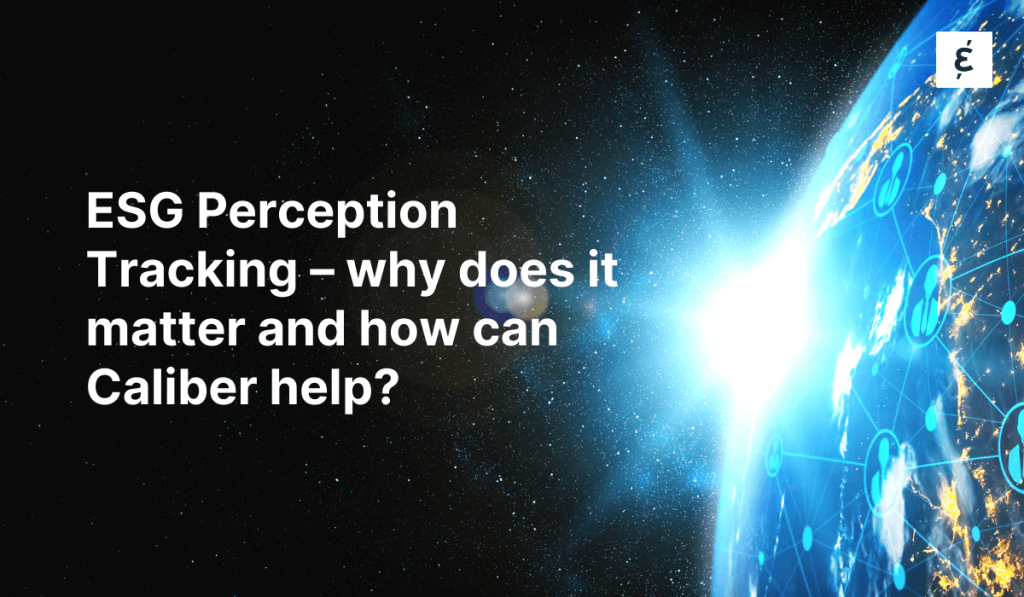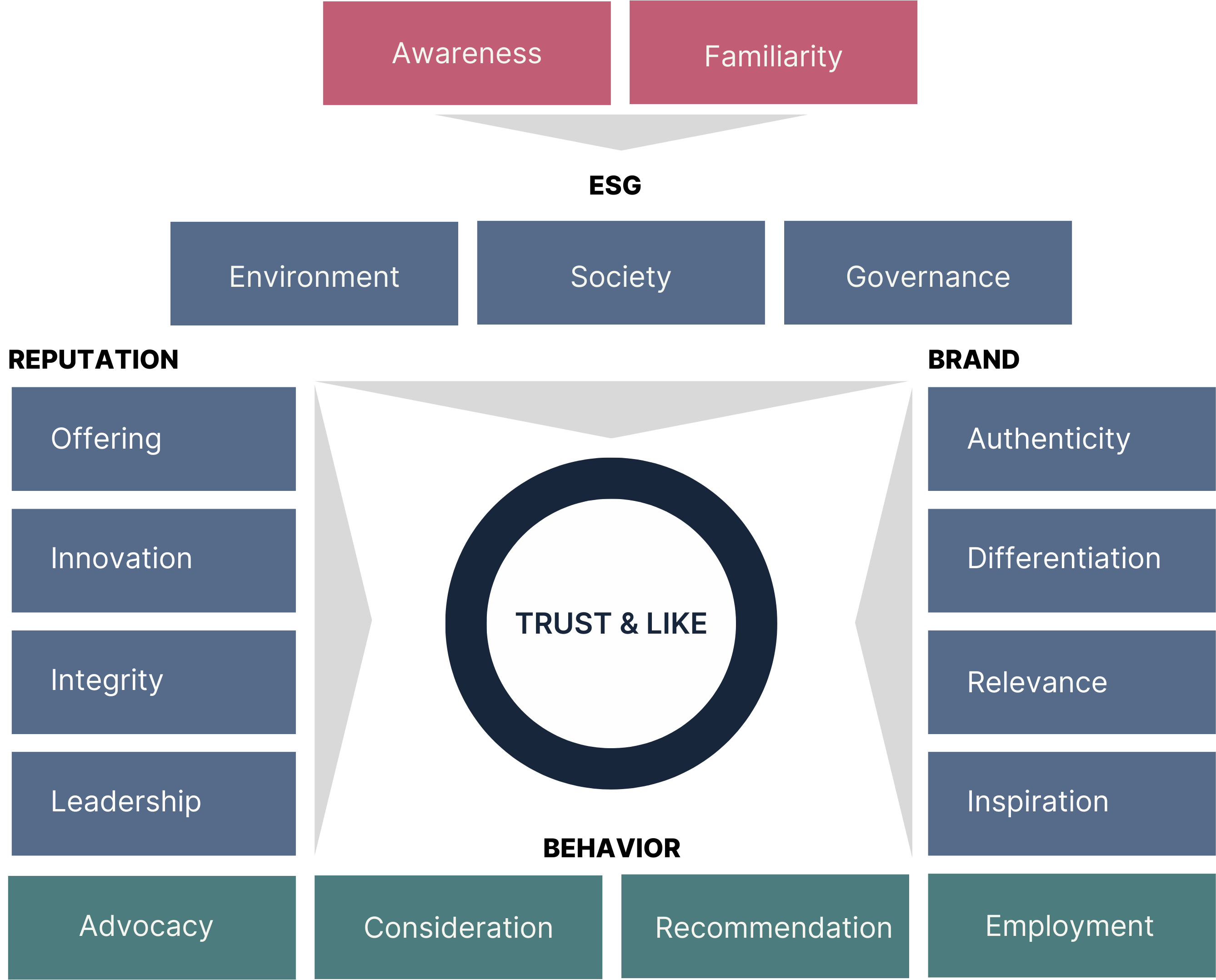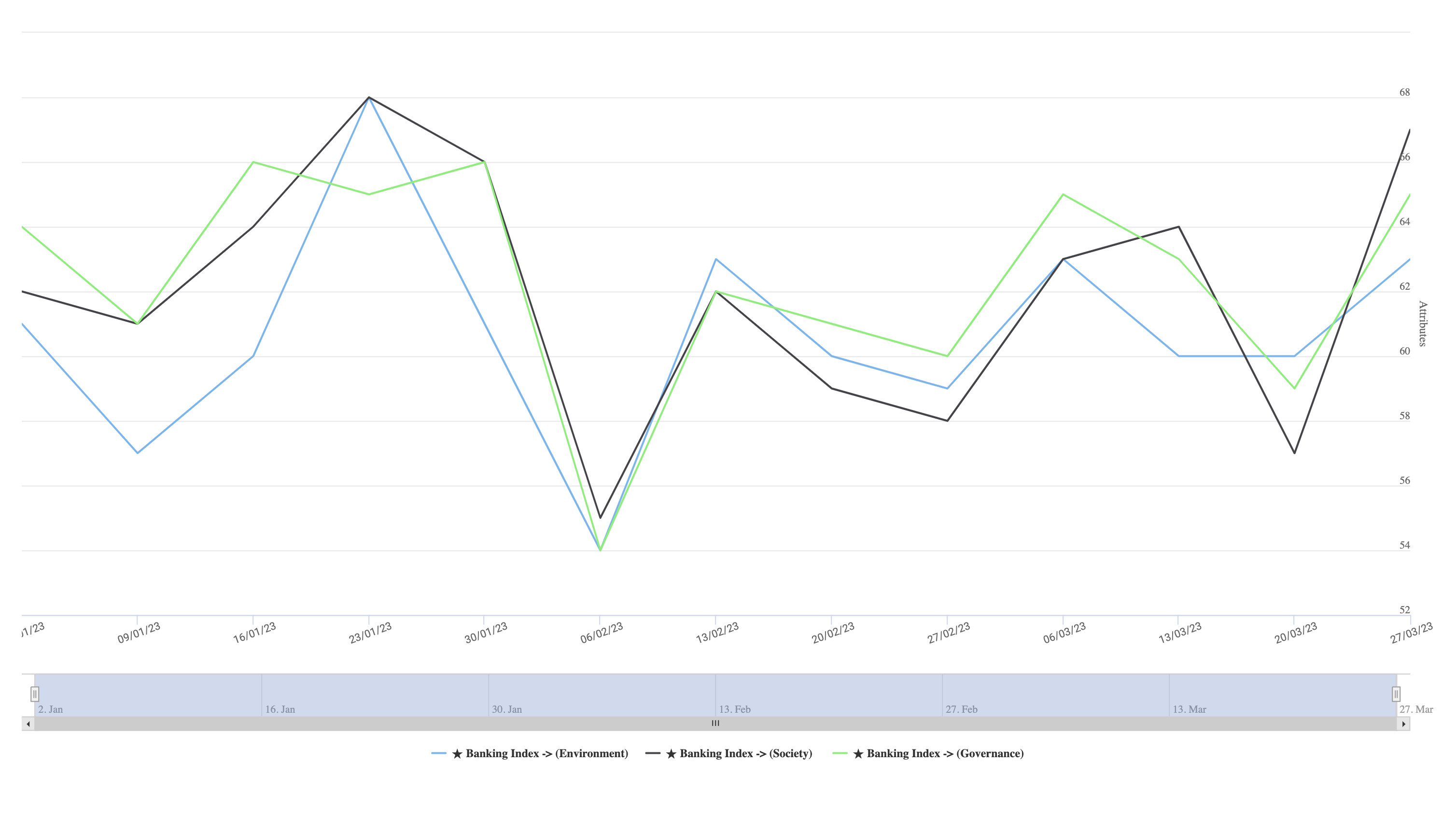ESG strategy: drive positive change with perception tracking
As ESG takes center stage in corporate decision-making, measuring how it’s perceived becomes crucial.

Caliber sets a new standard for ESG perception tracking to help companies close the gap between actions and perceptions.
ESG Perception Tracking is becoming more and more relevant as companies are under increasing pressure to address and report on their environmental, social, and governance performance.
As stakeholders become more interested in and aware of ESG issues, they expect companies to be transparent and accountable for their performance in these areas.
There is no doubt that many companies are increasingly doing more to meet their ESG goals. More often than not brands are motivated by the prospect of becoming more attractive in the eyes of potential investors, talent, and customers.
But do companies really know how their efforts are perceived by the public? It is not uncommon to see a mismatch when it comes to reality vs. perceptions.

At Caliber we are strong believers that a measurement of ESG performance alone cannot provide sufficient feedback for companies on their efforts.
For best results and actionability, it is crucial to also measure the Stakeholder Perceptions of the company’s ESG activities. That is why the ESG perception tracker has become an indispensable component of our corporate reputation monitoring platform.
It is designed to help corp. comms. leaders to understand how their company’s ESG efforts are perceived by stakeholders, identify areas for improvement, and communicate their progress effectively.
It also empowers companies to better manage risks, improve their reputation, and gain a competitive advantage in the marketplace.
Read the article below to find out why should companies focus more on how their ESG efforts are PERCEIVED by the public.
As ESG takes center stage in corporate decision-making, measuring how it’s perceived becomes crucial.
Caliber’s ESG perception tracking refers to the process of monitoring and analyzing how a company or organization is perceived by stakeholders in relation to its environmental, social, and governance practices.

This includes tracking stakeholders’ knowledge of the company’s impact on people, the planet, and society, of its ethical behavior, as well as their perceptions of the company’s performance in these areas.
The data is collected through Caliber’s Real-Time Tracker platform and can be used to identify areas for improvement and ways to communicate the company’s progress to stakeholders.
Caliber’s ESG tracking is based on perceptions rather than facts. Since the scores are based on evaluations of people who are highly familiar with the companies they evaluate, the results represent the views of relevant stakeholders – and as such, an important indicator of whether the company’s ESG efforts are recognized by its target audiences.
Tracking how people perceive a company’s ESG efforts is important for several reasons:
Companies that effectively address ESG issues and have a positive reputation for doing so can strengthen their reputation and brand image among stakeholders. This can lead to increased customer loyalty and employee engagement, and attract investors.
Customers, investors, employees, and the public overall are becoming more interested in and aware of ESG issues. Tracking how people perceive a company’s ESG efforts can help the company understand and meet the expectations of its most relevant stakeholders.
Understanding how people perceive a company’s ESG efforts can help identify potential risks related to environmental, social, and governance issues. This can help a company make better decisions and mitigate risks.
By tracking and reporting on how people perceive a company’s ESG efforts, the company can increase transparency and build trust among stakeholders. This can help the company communicate its progress and commitment to ESG issues.
Companies that effectively address ESG issues and have a positive reputation for doing so can reinforce their competitive advantage in the marketplace. Being able to track and demonstrate a strong reputation gives companies an edge when it comes to attracting customers, employees, and investors.
The simplicity and clarity of Caliber’s evaluation statements provide a no-nonsense yardstick for companies’ success in achieving and communicating their ESG agendas.
The multi-stakeholder and continuous nature of the measurement adds validity, accuracy, and relevance to the scores – and the ability to identify events and time periods where perceptions fluctuate, for further actionability.

The additional layer of ESG awareness, inherent in the Caliber methodology, adds insights into the degree to which stakeholders are informed about a company’s ESG performance, providing even more insight and actionability.
The ability to better understand how much stakeholders know about your ESG activities, what resonates with them, and what they expect – helps companies align reality and perceptions to optimize their ESG performance and how it’s communicated to relevant audiences.
The ability to split results by segments, geographies, and time periods allows greater granularity of insight and more opportunities for informing communication and engagement activities in an agile way.

Most international ESG frameworks, such as IIRC, GRI, and SASB, are designed for reporting on the progress of achieving ESG goals to investors.
While Caliber’s solution does not replace existing frameworks, it adds an additional layer of insight and informs Corporate Communications departments about whether these results are being conveyed adequately to target audiences, and how they resonate with stakeholders.
International standards are a basic and vital component in measuring ESG performance – but if not complemented by perception measurements, the company risks leaving its stakeholders in the dark, failing to consider their input and missing an opportunity to solidify its relationships with them within a critical area.
The score is made up of 3 quantitative questions, evaluating people’s perceptions of the company’s environmental impact, societal impact, and governance (ethical behavior).
All questions are scored using a 1-7 Likert scale and then averaged and normalized into a 0-100 scale without any weighting or adjustments.
Each individual question also gets a score to identify gaps between the 3 ESG elements.
Tracking ESG is now part of the standard Real-Time Tracker setup for no extra cost – but companies are encouraged to consider customizing the metrics included in their Caliber package to ensure they’re in line with the company’s strategy and objectives.
The ESG perception data collected via Caliber’s platform shows how much various stakeholder groups know about the company’s ESG activities and where the company leads or falls short compared to benchmarks, country, or sector indexes.
The data can be used to inform decisions relating to evolving ESG targets and initiatives, communicating them, engaging stakeholders around them, prioritizing topics and themes across various communication channels, reporting internally and externally on perceived ESG performance, and more.
As ESG issues continue to garner increased interest and awareness from stakeholders, the significance of ESG perception tracking is expected to rise. To effectively gauge stakeholder perceptions of their efforts, communication leaders must embrace new technology and tools.
Unfortunately, many current solutions lack actionable insights. To address this, Caliber’s methodology and team are now equipped with relevant ESG insights and expertise, allowing us to provide recommendations in this area in our regular client reporting and workshop activities.
Our mission at Caliber is to help companies continuously identify areas for improvement and communicate progress more effectively on an ongoing basis, so if you’re interested in finding out how your ESG performance is perceived by different stakeholders – get in touch.
© 2024 Group Caliber | All Rights Reserved | VAT: DK39314320